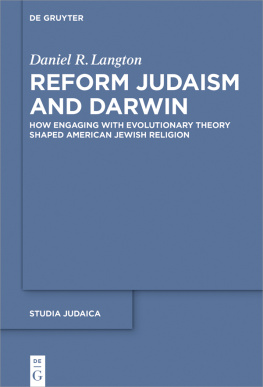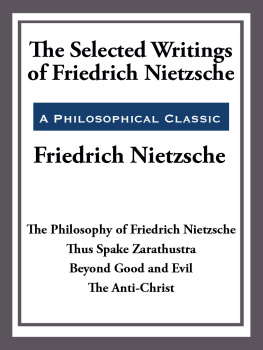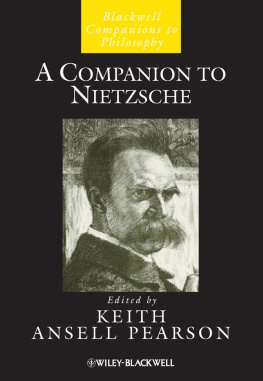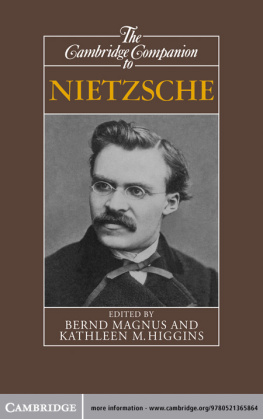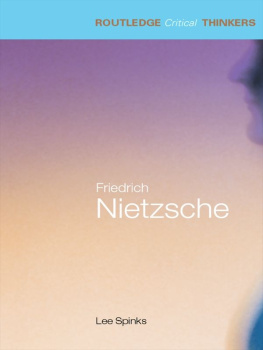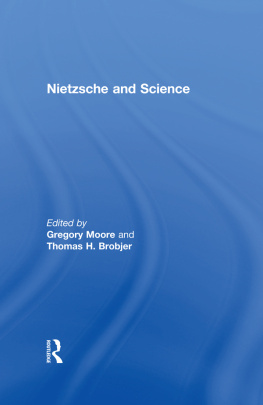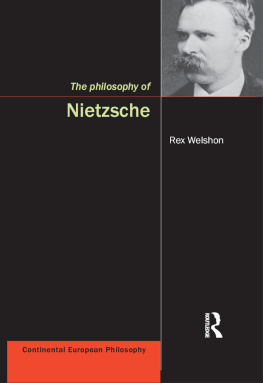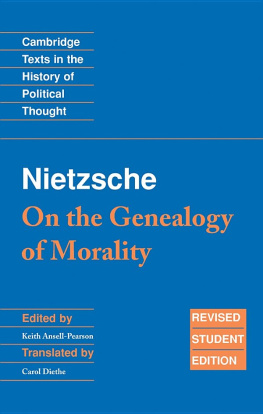
Th
e Moral Meaning of Nature
Th
e Moral Meaning
of Nature
Nietz sches Darwinian Religion and Its Critics
P e t e r J . Wo o d f o r d
Th
e University of Chicago Press
Chicago and London
Th
e University of Chicago Press, Chicago 60637
Th
e University of Chicago Press, Ltd., London
2018 by Th
e University of Chicago
All rights reserved. No part of this book may be used or reproduced in any manner whatsoever without written permission, except in the case of brief quotations in critical articles and reviews. For more information, contact the University of Chicago Press, 1427 E. 60th St., Chicago, IL 60637.
Published 2018
Printed in the United States of America
27 26 25 24 23 22 21 20 19 18 1 2 3 4 5
isbn- 13: 978- 0- 226- 53975- 1 (cloth)
isbn- 13: 978- 0- 226- 53989- 8 (paper)
isbn- 13: 978- 0- 226- 53992- 8 (e- book)
DOI: https:// doi .org/ ./ chicago/ ..
Library of Congress Cataloging-in-Publication Data
Names: Woodford, Peter J., author.
Title: Th
e moral meaning of nature : Nietzsches Darwinian religion and its
critics / Peter J. Woodford.
Description: Chicago ; London : Th
e University of Chicago Press, 2018. |
Includes bibliographical references and index.
Identifi ers: LCCN 2017039546 | ISBN 9780226539751 (cloth : alk. paper) |
ISBN 9780226539898 (pbk. : alk. paper) | ISBN 9780226539928 (e-book)
Subjects: LCSH: Nietzsche, Friedrich Wilhelm, 18441900. | Overbeck, Franz, 18371905. | Simmel, Georg, 18581918. | Rickert, Heinrich, 18631936. |
Life. | Evolution (Biology)Moral and ethical aspects. | Evolution
( Biology) Religious aspects. | Philosophy and scienceGermanyHistory. |
Philosophy, German19th century. | Philosophy, German20th century.
Classifi cation: LCC B3318.N3 W66 2018 | DDC 193dc23
LC record available at https://lccn.loc.gov/
Th
is paper meets the requirements of ANSI/NISO Z39.48- 1992
(Permanence of Paper).
Contents
Prefacevii
Introduction 1
1 Friedrich Nietz sche: A Darwinian Religion 25
2 Franz Overbeck: Th
e Life History of Asceticism 52
3 Georg Simmel: Evolution and the Self- Transcendence of Life 79
4 Heinrich Rickert: Th
e Autonomy of Agency and the Science of Life 105
Conclusion 132
Acknowledgments151
Notes153
Bibliography171
Index 179
Preface
Any invitation to work through the nuances of past thinkers many of whom
are unknown to contemporary readers requires something of a defense and,
perhaps even, an exhortation. So, here it goes. It is perhaps not an overstatement to say that most philosophers today see the central task of philosophy to be one of establishing what the advancing sciences, especially neuroscience, cognitive science, and evolutionary biology, tell us about the topics that have animated Western philosophical and theological traditions the topics of
mind, agency, knowledge, ethics, and religion. Th
ose provoked to refl ect on
these topics today cannot ignore the sciences, yet it is also fair to say that it is far from clear just what science tells us, or can tell us, without veering beyond bare data into philosophical assumptions that we bring to our investigation.
For historians, this is of course not a new state of aff airs. It is only since the seventeenth and eighteenth centuries that distinctions between separate domains of science, philosophy, and religious thought began to emerge. Indeed, it is a remarkable fact that the term scientist, used to designate a defi nable professional and social role with a distinct aim and set of interests, was coined only in 1833 by the English philosopher and theologian William Whewell.
Since the origins of modernity in the West whenever that was and the
new understandings of nature that underpinned the scientifi c revolutions of the seventeenth and eighteenth centuries, students of nature, philosophers, and religious thinkers have been interlocked in a sort of scrum. Th
e territory,
legitimacy, and even the identities of each of these complex spheres was never a given, brute fact but has been constructed through debate over fundamental questions, new knowledge- gathering techniques, new conceptions of natural
processes, and the challenge of relating the new to the old. Th
e motivation
viii P r e f a c e
to understand the negotiation between these spheres, especially in response to new understandings of nature, animated my writing of this book.
What Darwin was and has become for discussions of religion and science
in the Anglo- American contexts, Friedrich Nietz sche has been on the Continent. Nietz sche represented starkly for a generation of German philosophers the promise and peril of Darwinian, or even more broadly naturalistic, views for ethics, metaphysics, and the philosophy of religion. Indeed, Nietz sche is still a live resource for a stunning variety of contemporary disciplines, and his work has increasingly drawn the attention of philosophers working in both
the Analytic and Continental traditions. Th
is can I contend be explained
in large part by the fact that Nietz sches positions in various areas were undergirded by a general aim to translate human philosophical and religious con
cerns into the framework of an evolutionary picture of life. Th
e other three
thinkers in this study are examples of those who confronted the philosophical implications of Darwinian and biological thinking through their reading of
Nietz sche.
Nietz sche appeared to have presented even more trenchantly the animat
ing impulses behind traditional religious beliefs and aspirations than the
allegedly more superfi cial English psychologists like Darwin (whom he
criticized), and so his brand of naturalism appeared to present a much more compelling account of what evolution meant for philosophy. But, this book
will stress, Nietz sche was driven by existential, and I will even go so far as to say religious, aspirations that were foreign to Darwin. Th
is book reconstructs
how Nietz sche negotiated the relationship between religion and science, how three of his most immediate critics steeped in the same tradition of German thought Franz Overbeck, Georg Simmel, and Heinrich Rickert responded
to the same concerns, and how evolutionary conceptions of nature and bio
logical life informed this debate in each case. Th
ese thinkers lived in a time
during which philosophy was dominated by the question of its task and in
relation to the advancing sciences, and this problem shaped discussion of
Darwin. Understanding the negotiation of science, philosophy, and religion
around the topic of evolution in this philosophical moment can, I hope, in
form our own understanding of the complex entanglement between these
areas today.
With this exhortation, it will be clear that this book spans two distinct
sorts of interest that might be thought to be in tension, or at least not obviously related. Th
is book was written to satisfy both historical and philosophical in
terests. Yet it is oft en thought that while historians are less concerned with the relevance of the past to the present, philosophers (and perhaps scientists as well) are less concerned with the past merely for its own sake, unrelated to
Next page

